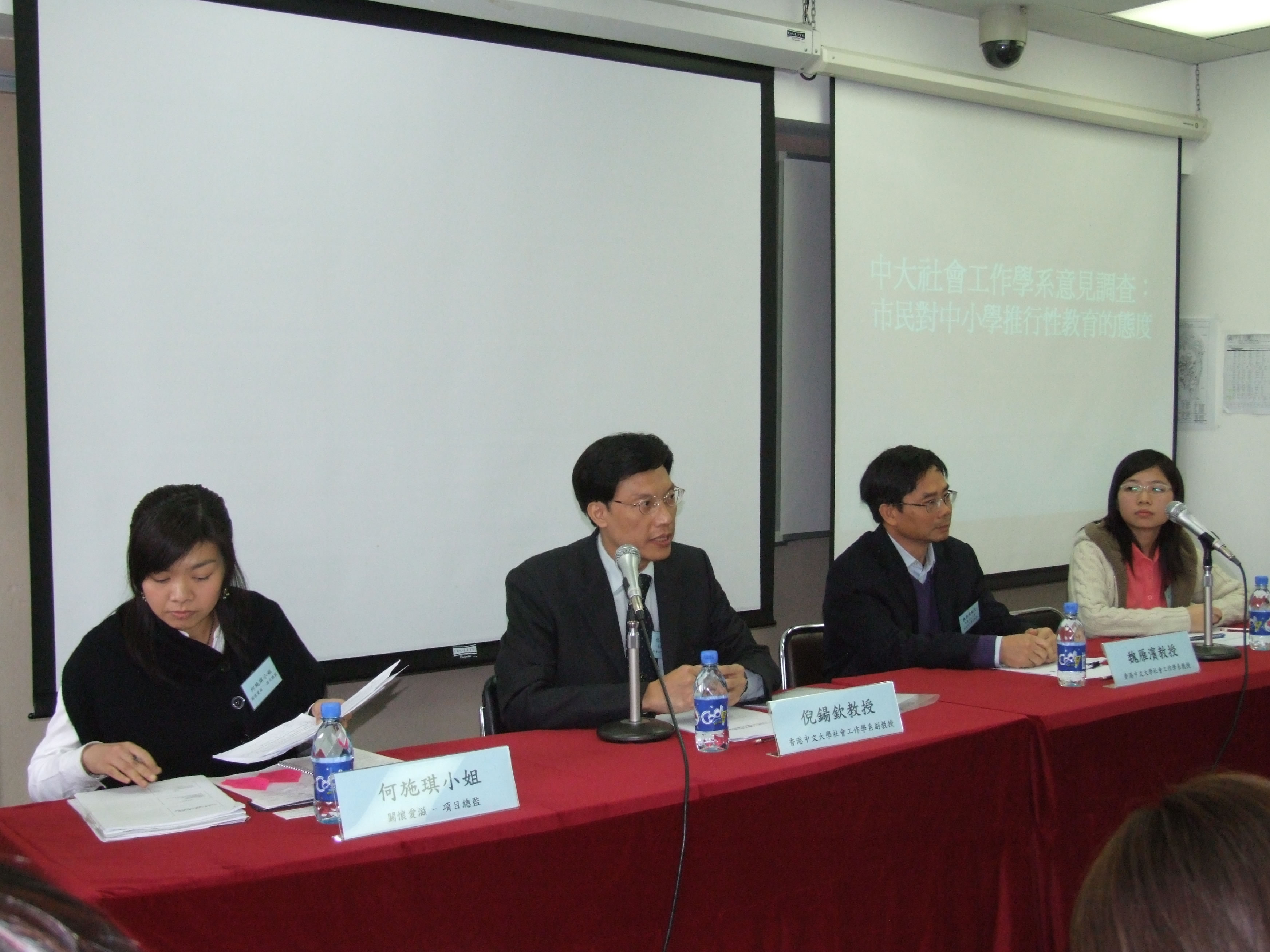News Centre
CUHK Social Work Department Conducts a Public Survey on School-based Sex Education in Hong Kong
Teenage pregnancy is no longer an uncommon news headline in recent years. Similar storyline has also been featured in local and overseas movies, such as the Japanese production “Mother at 14” and the local film “2 young”. In fact, official statistics have clearly shown the problem years ago. For instance, among those aged 26 or below who requested for pregnancy termination in the past three years, 3% of which were teenagers below 16. Besides, 183 teenagers aged below 18 gave birth in 2006. All these incidents have again aroused the public concern on the need of sex education for teenagers. Yet, sex education has never been made a compulsory subject in the local school curriculum. The existing Guidelines on Sex Education in Schools were even published some ten years ago in 1997. Therefore, questions such as whether sex education should be launched in schools and, if so, what are the proper contents are social issues worthy of discussion.
The Department of Social Work at The Chinese University of Hong Kong commissioned the Hong Kong Institute of Asia-Pacific Studies to conduct a telephone survey on the public attitude towards sex education in schools last November. The survey had successfully interviewed 821 respondents, including 389 males (47.4%) and 432 females (52.6%), and the response rate was 45.9%.
Background of respondents:
Among these respondents, a majority of them (36.2%) was aged between 35 and 49, followed by those aged between 50 and 59 (20.8%). There were respectively more than one-third respondents who had received senior secondary education (36.2%), and tertiary or university education (34.9%). Besides, 68.8% of the respondents had no religious belief, 30.3% were unmarried, and 39.4% had schooling child(ren). Among all 320 respondents who had schooling child(ren), 29.7% and 25.9% of those schooling children had senior secondary school education (i.e. Form 4 to Form 7) and tertiary education respectively. Moreover, a majority of the respondents (62%) were working adults, followed by home-makers (17.1%). Over one-third (36.7%) of the respondents had a monthly household income of $30,000 and above. Nearly 40% of the respondents had received sex education in schools before (Table 1).
Survey results:
To gauge the public attitude on sex education in schools, the respondents were asked about their views on a series of statements. The respondents showed support for the promotion of sex education in schools, with over 80% of the respondents agreeing the following statements: “It is very important for schools to provide sex education for children and adolescents” (84.6%), “Sex education in schools is an effective measure in preventing sexual diseases and AIDS” (81.9%); and disagreeing that “There is no need for schools to provide sex education since there is a huge amount of sex-related information in the current mass media” (89%). Also, two-third of the respondents agreed on statements such as “Sex education should be a compulsory subject for all primary and secondary students” (67.9%), and “Schools should strictly prohibit primary and secondary students from having sexual relationship” (64.9%); and disagreed that “Sex education in schools will cause primary and secondary students to have sex behavior earlier” (67.9%). However, no consensus had been reached on the statement “Most sex knowledge is learnt through life experience rather than school training” as 42.5% of the respondents agreed while another 31% disagreed. In addition, half of the respondents (50.6%) disagreed on the statement that “Sex education should be the responsibility of parents rather than schools” (Table 2) .
Concerning the content of sex education in schools, respondents tended to agree the following: “self-protection of one’s own body and avoidance of sexual assault” (98.9%), “correct concept and attitude towards sex” (96%), “knowledge of safe sexual behavior” (65.6%), and “methods of using condoms and other contraceptive devices” (61.4%) (Table 3). Moreover, when asked to rate the effectiveness of sex education in schools (with 0 meaning total ineffectiveness and 100 meaning total effectiveness), the mean score was 47 (with standard deviation 18.23). In addition, nearly half (42.4%)of the respondents opined that sex education should start at primary level while 37.4% opted for junior secondary level (Table 4).
Significant findings were also identified from group comparisons. For example, compared with the younger respondents, senior respondents tended to disagree on the importance of sex education in schools for children and adolescents, and believe in the probable impact of earlier sex behavior once sex education was launched in schools. Similarly, fewer senior respondents agreed on the necessity of school teaching on sex education as a huge amount of sex related information was already available in the mass media. Furthermore, senior respondents comparatively agreed that primary and secondary students should be strictly probihited from having sexual relationship. Moreover, the more senior the respondents, the less likely would they agree on introducing the use of condoms and other contraceptive methods, as well as the cultivation of correct concept and attitude towards sex in sex education (Table 5).
Comparatively speaking, respondents who had received sex education before were more prone to agree on the following: the importance of providing sex education for children and adolescents in schools (91% versus 81.1%), compulsory sex education for all primary and secondary students (70.1% versus 66.7%), sex education in schools as an effective measure in preventing pre-marital pregnancy (71.3% versus 68.9%), teaching the use of condoms and other contraceptive methods in sex education (68.5% versus 56.9%), and the cultivation of correct concept and attitude towards sex (98.8% versus 94.3%). Besides, this group of respondents tended to disagree that sex education in schools would lead to early sexual behavior among primary and secondary students (70.3% versus 65.8%).
Conclusion:
In summary, the majority of the respondents agreed that the provision of sex education in schools is very important as it would bring positive impacts. Yet, respondents believed that sex knowledge could be learnt from school training as well as life experience. Schools should not be the sole agent in launching sex education and families should also bear the responsibility. Among the various suggested contents for sex education in schools, the inarguable ones included self-protection, and the correct concept and attitude towards sex. Besides, senior respondents were more conservative when compared with their younger counterparts. Moreover, consistent differences were noted between respondents who had received sex education before and those who had not, with the former showing a more positive attitude towards sex education in schools.









